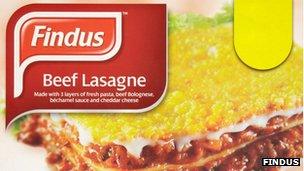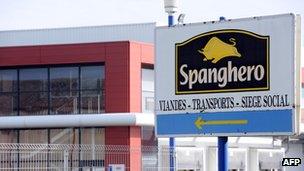Horsemeat scandal: French supermarkets pull beef products
- Published

The scandal broke after it emerged that Findus beef lasagne sold in Britain contained up to 100% horsemeat
Six French supermarket chains have withdrawn frozen beef meals made by Findus and Comigel after it emerged some beef-labelled foods sold in Europe and the UK contained horsemeat.
France is investigating if the frozen food companies knew of the horsemeat in their products. Findus says it has been misled by its Romanian meat supplier.
Romania has launched a probe into its abattoirs in response to the claims.
Officials said they would take action if laws had been broken.
Swedish food giant Findus withdrew ready meals in France and Sweden on Friday after it emerged that its frozen beef lasagne sold in Britain contained up to 100% horsemeat.
The Findus products were prepared by French food manufacturer Comigel using meat provided by Spanghero, a meat-processing company also based in France. Spanghero, in turn, obtained its meat from a Romanian supplier.
'We were deceived'
The French supermarket chains decided to recall Findus and Comigel products due to concerns over a "labelling non-compliance in regards to the nature of the meat", the national retail association FCD said on Sunday.
Products withdrawn include pasta dishes with meat sauce, shepherd's pie and moussaka. The chains taking action include Carrefour, Monoprix, Auchan, Casino, Cora and Picard.
The decision was made due to to concerns over a "labelling non-compliance in regards to the nature of the meat", FCD said in a statement.
It added that French authorities had indicated there was no health risk from the products.
"The retailers are following the investigations carried out by suppliers with the greatest attention and waiting for the results of public inquiries," it said.
The French probe aims to determine who supplied the horsemeat and whether the ready meal companies knew about the contamination.
If there is evidence that the firms knowingly mislead consumers, "we will not hesitate to take legal action", French Consumer Affairs Minister Benoit Hamon told Le Parisien daily, external.
Early findings from the probe indicated that the horsemeat had been supplied since August, he added.
"We have estimated that the profits drawn from what seems to be a fraud lie around 300,000 euros (£253,000)," Mr Hamon said.
Preliminary results of the investigation are expected to be released on Wednesday.
Responding to the food scandal, the director of Findus France, Matthieu Lambeaux, said in a statement the company would file a legal complaint on Monday.
"We thought we had certified French beef in our products. But in reality, we were supplied with Romanian horsemeat. We have been deceived," Mr Lambeaux said.

French company Spanghero has also threatened to take legal action against its Romanian supplier
French company Spanghero has also threatened to take legal action against its Romanian supplier.
Romania's food industry union has rejected the allegations.
"I find it hard to believe that a Romanian abattoir could have delivered horsemeat that was labelled beef," union head Dragos Frumoso told AFP news agency.
"If [the importer] did not make any protest when it received the meat to say that it was horse and not beef, then either it was an accomplice to the Romanian producer or it changed the labels afterwards."
The scandal has highlighted the bewildering complexity of the food business in the EU today, the BBC's Hugh Schofield reports from Paris.
A Swedish brand Findus supplying British supermarkets employed a French company Comigel to make its ready meals, our correspondent says.
To get meat for its factory in Luxembourg, Comigel called on the services of another French firm Spanghero. This company in turn used an agent in Cyprus, who in turn used an agent in the Netherlands, who placed the order at an abattoir in Romania, our correspondent says.
That extraordinary Europe-wide chain of instructions has now been identified by the French anti-fraud office, which is piecing together how so much horsemeat masquerading as beef entered the food chain, our correspondent adds.
- Published15 January 2013
- Published8 February 2013
- Published10 April 2013